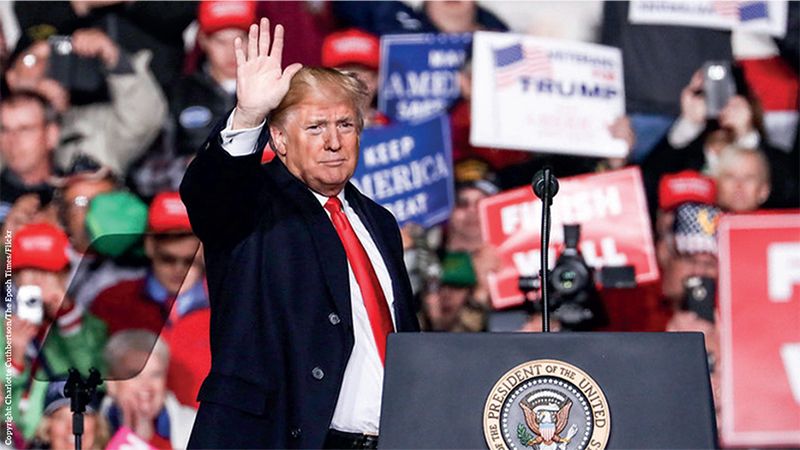Despite 2024 being expected to be the hottest year on record, according to projections by the European climate service, Donald Trump’s victory in the race to become the next US president has put the US on a path that “contrasts sharply” with global efforts to meet climate goals.
From a potential repealing of the Inflation Reduction Act and enacting a ‘drill, baby, drill’ approach to fossil fuel extraction, to leaving unilateral global climate agreements, investors have largely agreed that momentum to combat climate change in the US will likely slow down drastically. Shares in many clean energy tech companies, such as Orsted, Vestas and Nordex, have already fallen significantly in the wake of the election result.
Here, investors predict the fallout from the US election result.
Impact on US climate law
President Trump could look to hinder climate law through executive actions, such as tightening the rules around qualification for tax credits or by freezing the rollout of grants and loans for green energy projects, noted David Boyce, CEO of North America at Schroders Greencoat.
“Trump could also bring back section F, which would reclassify the role of thousands of federal employees. In doing so, President Trump could gain a lot of influence over personnel at key policy institutions such as the Environmental Protection Agency (EPA). His first administration cut EPA budgets and limited its regulatory activities. These areas of government would be particularly vulnerable to further cuts.”
Additionally, Bill Harter, principal ESG solutions advisor at Visual Lease, explained although SEC chair Gary Gensler’s term does not expire until 2026, one commissioner’s term expires at the end of 2024 and another in 2025. One of the two was a ‘Yes’ on the SEC disclosure rule, and, although the chair has a lot of power to set the agenda, the commission will have a 3-2 split against ESG regulation in the future, further hampering regulatory efforts on climate reporting.
Commenting on the election result, Maria Lettini, CEO of the US Forum for Sustainable and Responsible Investment, said: “The investment community’s role in creating a sustainable and resilient economy has never been more important. Sustainable investing identifies unmanaged risks and unlocks investment opportunities in order to safeguard and increase long-term portfolio value. Investors require transparency through clear reporting requirements, the ability to engage the companies they own on financially material issues, and certainty that policymakers will support robust climate action. That remains true regardless of the political landscape. We commit to working with the next administration and other newly elected officials across the US to advance a more just and sustainable American economy.”
Implications for the Inflation Reduction Act
The Inflation Reduction Act (IRA), bought in by the Biden administration, was billed as “one of the largest investments in the American economy, energy security and climate that Congress has made in the nation’s history”.
Despite Donald Trump repeatedly expressing a desire to repeal the Act, Nazmeera Moola, chief sustainability officer, Ninety One, said she does not expect a blanket repeal of all elements of the Inflation Reduction Act.
“Large portions of the IRA are increasingly being defended by Republicans – whose districts benefit from the investment. However, if elements like the green hydrogen credits are retained, we are likely to see amendments in the manner in which they are implemented that would result in more questionable climate outcomes.”
Boyce agreed: “Ending green tax incentives would require support from the US Congress, which the new president may not be able to garner given the broad economic stimulus the IRA has produced.
“Based on our analysis of data on green energy projects, we have found that more than 50% of new jobs and capital expenditure have been announced in Republican-leaning states compared with 20% in Democrat-leaning states since the passage of the IRA.”
However, it is expected that Trump could look to rescind any unspent funds under the IRA.
Tariffs
The Republican victory also opens the door for tax credits for EVs to be rescinded, continued Moola: “However, the proposed tariffs will provide some insulation for US EV producers from cheaper Chinese competitors. Other considerations include the impact of the prospective tariff hikes on the cost of new renewable projects in the US and the likely expansion of oil and gas exploration on federal lands as environmental regulation is rolled back.”
Alex Monk, portfolio manager of global resource equities at Schroders, offered another view: “Policy is not the only driver of the energy transition, and the US is not the only market for companies across the space. We have always stressed that the long-term drivers of the global energy transition are three-fold: improving costs and technologies; growing consumer and corporate demand for sustainable energy goods and services; and long-term policy support. In this context, while the shifting US policy landscape is undoubtedly unhelpful, it should not distract from the strength of other forces encouraging investment in the space.
“Valuations across the energy transition equity sector are already more than pricing in any disruption and change.”
Global reaction
In Europe, the reaction has largely been one of horror, said Quilter Investors’ investment strategist, Lindsay James: “There is a sense that global trade and relations are about to be severely tested. Europe’s approach to net zero, with relatively high carbon costs under the EU Emissions Trading Scheme, is making international competitiveness a challenge in a world led by Donald Trump and Xi Jinping.
“The effects of climate change are increasingly evident, with recent devastating floods in Valencia still fresh in memory. Whether climate policies can survive despite these impacts is a major question for Europe, which is now shuttering auto factories that are no longer profitable under mounting regulation. Meanwhile, Trump’s pledge to ‘drill, baby, drill’ contrasts sharply with Europe’s climate goals.
“Even though a more certain path to lower interest rates in Europe is welcome, political leaders face fundamental questions with no easy answers, risking that the electorate may ultimately decide for them.”
From a UK perspective, Joe Dharampal-Hornby, head of public affairs and communications at the UK Sustainable Investment and Finance Association (UKSIF), said things are “undoubtedly going to get worse”, at least for the next few years, in terms of the US’s role in the transition.
Speaking the UKSIF Leadership Summit, he said: “The ESG backlash almost grew out of the first Trump defeat, and it tended to grow well while the Republicans were in opposition. People around Trump have much more squarely identified ESG as a real enemy of their Project 2025 manifesto, and these attacks in the US could infiltrate across the pond.
“It’s bad news for the US. But, ultimately, there is an opportunity for the UK to further underline its global leadership. I think it poses some really interesting questions for the UK and London’s role as a global financial green centre.”
Elsewhere, the ramifications of a Trump presidency on China’s engagement on climate could be wide-reaching. Nicolas Lockhart, global arbitration, trade and advocacy partner at law firm, Sidley’s, said that the big risk with climate would be if China disengaged.
“The US and China have worked reasonably collaboratively around COPs, as the two biggest emitters to try to move things forward effectively. In the absence of the US, the question is: what will China’s approach be? China is on its own decarbonisation pathway and transition to renewables.
“In a situation like this, hopefully, the rest of the international community continue to tackle global problems with collective engagement and action. China may well seek to play a greater leadership role. And it will also take engagement and leadership from other countries to help tackle these global problems through international cooperation if there is less US engagement.”
Despite the US likely leaving international commitments to address climate change, Ninety One’s Moola said she expects Countries like China and India to continue to focus on energy transition-related investments, as “these investments have been driven by their positive financial benefits and impact on growth to date”.
Investors need to adopt a ‘resilient approach’
Tara Irwin, senior ESG analyst at Hargreaves Lansdown, concluded: “The years leading up to 2030 are critical for achieving net-zero goals, and a reduced US commitment could stall international efforts. A return to fossil fuel priorities risks reversing emissions reductions and may discourage other nations from advancing their own climate transitions. This uncertainty in policy support could shake investor confidence in renewable energy and green infrastructure, sectors where consistent backing is essential.
“On the social front, Trump’s approach to immigration, including possible large-scale deportations, could exacerbate workforce shortages in sectors such as agriculture, construction, and healthcare, with negative economic and operational implications for businesses. His administration’s likely lack of support for transgender rights and other protections may also strain corporate governance as companies face heightened pressure to champion diversity, equity, and inclusivity within their workforces.
“In this environment, investors will need to adopt a resilient approach. Without robust federal support, private sector commitments will play a crucial role in sustaining the momentum in the US for a more equitable and net zero aligned global economy.”








